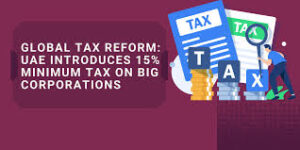Dubai has long been known for its business-friendly policies, attracting investors and entrepreneurs worldwide. However, with the introduction of Federal Corporate Tax (CT) in the United Arab Emirates (UAE), businesses operating in Dubai must adapt to the new taxation framework.
This guide provides a detailed breakdown of Dubai’s corporate tax, including rates, exemptions, compliance requirements, and how it impacts businesses.

1. Corporate Tax Rates in Dubai
The UAE government introduced corporate tax in June 2023 to align with international tax standards while maintaining its economic competitiveness. The corporate tax structure is as follows:

✅ Tax Rates
0% – Applicable to taxable income up to AED 375,000 to support small businesses and startups.
9% – Applied to taxable income above AED 375,000.
15% – Applicable to large multinational corporations with global revenues of at least €750 million under the OECD Pillar Two Framework (Minimum Global Tax Rate).
These rates ensure that small and medium-sized enterprises (SMEs) remain competitive while large businesses contribute to the national economy.
2. Exemptions and Special Considerations
Not all businesses in Dubai are required to pay corporate tax. The following entities are exempt from taxation:
❌ Exempted Businesses
Government Entities and government-controlled organizations.
Businesses engaged in oil, gas, and other natural resource extraction (subject to Emirate-level taxation).
Public and private pension or social security funds.
Qualifying public benefit entities (charities, foundations, and non-profits).
Investment funds that meet specific regulatory requirements.
Free Zone Companies that meet the criteria for Qualifying Free Zone Person (QFZP) status.
🏢 Dubai Free Zone Businesses & Corporate Tax
Dubai has multiple Free Zones, including Dubai International Financial Centre (DIFC), Jebel Ali Free Zone (JAFZA), and Dubai Multi Commodities Centre (DMCC). Businesses in these zones can enjoy a 0% corporate tax rate on qualifying income, provided they meet certain conditions:
Maintain adequate economic substance within the UAE.
Adhere to transfer pricing regulations.
Generate eligible income (non-qualifying income is subject to standard corporate tax rates).
This means businesses operating exclusively within Free Zones can still benefit from tax incentives, but those engaging in mainland business activities may face taxation.
3. Corporate Tax Registration & Compliance
Dubai-based businesses must comply with tax laws, including registration, record-keeping, and filing tax returns with the Federal Tax Authority (FTA).
📝 Mandatory Compliance for Businesses
Corporate Tax Registration: All businesses must register for corporate tax, including those in Free Zones and exempt entities.
Financial Record-Keeping: Maintain accurate financial statements for at least 7 years.
Tax Return Filing: Businesses must file tax returns annually, within 9 months of the end of their financial year.
Transfer Pricing Rules: Businesses conducting transactions with related parties must adhere to OECD Transfer Pricing Guidelines to ensure transparency and compliance.
Failure to comply may result in penalties from the Federal Tax Authority (FTA).
4. Impact of Corporate Tax on Dubai Businesses
Dubai’s corporate tax system has significant implications for businesses:
📈 Positive Impacts
✔ Enhanced Economic Stability – The new tax system ensures sustainable government revenue to fund infrastructure and public services.
✔ Global Business Compliance – Aligning with international tax standards helps prevent tax evasion and strengthens Dubai’s reputation as a transparent business hub.
✔ Encouragement of SMEs – The 0% tax rate for income up to AED 375,000 supports small businesses and entrepreneurs.
⚠ Challenges for Businesses
❌ Higher Operating Costs – Businesses now need efficient tax planning to minimize tax burdens.
❌ Compliance Requirements – Companies must adapt their accounting systems and maintain records per FTA regulations.
❌ Impact on Foreign Investors – The tax framework reduces Dubai’s historical tax-free advantage, but incentives for Free Zone businesses remain.
5. How Businesses Can Prepare for Corporate Tax
Businesses in Dubai must take proactive steps to ensure compliance and optimize their tax strategies.
✅ Steps to Prepare for Corporate Tax:
1️⃣ Register for Corporate Tax with the Federal Tax Authority (FTA) to avoid penalties.
2️⃣ Review Business Structure – If your company operates in Free Zones, ensure you qualify for tax exemptions.
3️⃣ Update Financial Records – Maintain proper accounting records for tax filing and compliance.
4️⃣ Understand Transfer Pricing Rules – Businesses with related-party transactions must comply with OECD guidelines.
5️⃣ Consult Tax Experts – Work with accounting and tax advisors to develop an efficient tax strategy.
Reliant Accounting Services can assist businesses in tax registration, compliance, and strategic tax planning to ensure smooth adaptation to Dubai’s corporate tax policies.
By understanding corporate tax regulations, maintaining accurate records, and leveraging tax planning strategies, businesses can continue thriving in Dubai’s dynamic economic landscape.
For expert guidance on corporate tax compliance, financial planning, and business advisory services, contact Reliant Accounting Services today!



